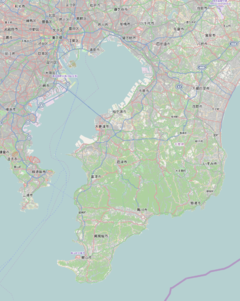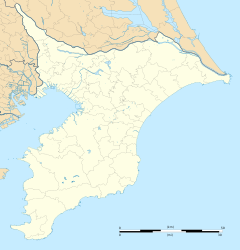Moto-Yawata Station
JB28 S21 Motoyawata Station 本八幡駅 | |||||||||||||||||||||||||
|---|---|---|---|---|---|---|---|---|---|---|---|---|---|---|---|---|---|---|---|---|---|---|---|---|---|
 Elevated JR Motoyawata Station | |||||||||||||||||||||||||
| General information | |||||||||||||||||||||||||
| Location | 2-chome Yawata, Ichikawa City, Chiba Prefecture 272-0021 Japan | ||||||||||||||||||||||||
| Coordinates | 35°43′18″N 139°55′37″E / 35.7218°N 139.9269°E | ||||||||||||||||||||||||
| Operated by | |||||||||||||||||||||||||
| Line(s) | |||||||||||||||||||||||||
| Platforms | 2 island platforms (1 JR East, 1 Toei) | ||||||||||||||||||||||||
| Tracks | 4 (2 for JR East, 2 for Toei) | ||||||||||||||||||||||||
| Connections | KS16 Keisei Yawata | ||||||||||||||||||||||||
| Construction | |||||||||||||||||||||||||
| Structure type | Underground | ||||||||||||||||||||||||
| Other information | |||||||||||||||||||||||||
| Status | Staffed ("Midori no Madoguchi" ) | ||||||||||||||||||||||||
| Station code |
| ||||||||||||||||||||||||
| Website | Official website | ||||||||||||||||||||||||
| History | |||||||||||||||||||||||||
| Opened | 1 September 1935 (JR East) 19 March 1989 | ||||||||||||||||||||||||
| Passengers | |||||||||||||||||||||||||
| FY2018 | 60,125 (JR); 40,500 (Toei) | ||||||||||||||||||||||||
| Services | |||||||||||||||||||||||||
| |||||||||||||||||||||||||
| |||||||||||||||||||||||||
Motoyawata Station (本八幡駅, Motoyawata-eki) is a junction passenger railway station in the city of Ichikawa, Chiba, Japan, operated by East Japan Railway Company (JR East) and Tokyo Metropolitan Bureau of Transportation (Toei Subway). It is the only station on the Toei Subway that is located in Chiba Prefecture.
Lines
[edit]Moto-Yawata Station is served by the Chūō-Sōbu Line of JR East and the Toei Shinjuku Line subway. The 23.5 kilometer Toei Shinjuku Line terminates at this station.
Station layout
[edit]The station is divided into two sections: the elevated JR station and the underground subway station. The areas outside the ticket gates of the two sections are connected by a passage.
JR Platforms
[edit]The JR station has one island platform serving two tracks.[1] There is no platform for rapid and limited express services on the two other tracks of the Sōbu Main Line.
| 1 | JB Chūō-Sōbu Line | for Kinshichō, Akihabara, Shinjuku and Mitaka |
| 2 | JB Chūō-Sōbu Line | for Nishi-Funabashi, Tsudanuma and Chiba |
-
JR East platforms
Toei Platforms
[edit]The subway station also has one island platform serving two tracks. While one end of the subway station is connected to the JR East station, the other end is connected to Keisei Yawata Station on the Keisei Main Line.
| 1, 2 | S Shinjuku Line | for Bakuro-Yokoyama, Ichigaya and Shinjuku KO Keio Line for Hatsudai, Hatagaya, Meidaimae, Chōfu, and Hashimoto |
-
Toei platforms
History
[edit]The station opened on the Sōbu Main Line on September 1, 1935.[2] The Toei Shinjuku Line was extended to this station on March 19, 1989.
Passenger statistics
[edit]In fiscal 2018, the JR portion of the station was used by an average of 60,125 passengers daily (boarding passengers only).[3] The Toei Subway portion of the station was used by 40,500 passengers daily[4]
Surrounding area
[edit]- Ichikawa City Hall
See also
[edit]References
[edit]- ^ Moto-Yawata Station guide map by JR East. (in Japanese) Retrieved on 2008-10-26.
- ^ Moto-Yawata Station information by JR East. (in Japanese) Retrieved on 2008-10-26.
- ^ 各駅の乗車人員 (2018年度) [Station passenger figures (Fiscal 2018)] (in Japanese). Japan: East Japan Railway Company. 2020. Retrieved 11 August 2020.
- ^ 民鉄等駅別1日平均運輸状況……{2018(H30)年度} (in Japanese). Japan: Chiba Prefecture. 2020. Retrieved 11 August 2020.
External links
[edit]![]() Media related to Moto-Yawata Station at Wikimedia Commons
Media related to Moto-Yawata Station at Wikimedia Commons





